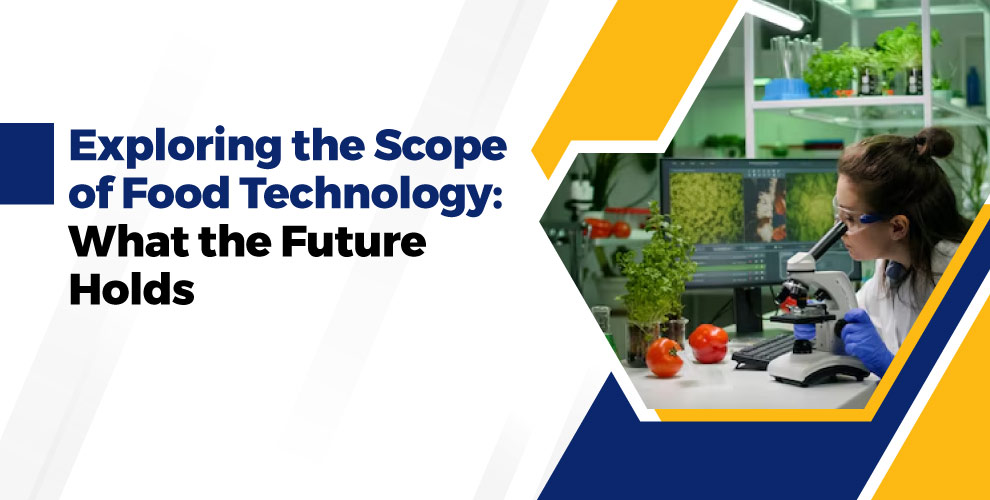Introduction:
Food Technology is an interesting field as it helps us understand the nutritional composition and characteristics of food products and the various physical and chemical changes that happen during the different food processing stages. Food rich in nutritional value is an essential aspect of our well-being; food technologists are needed to ensure adherence to stringent safety and quality standards during each process to make our meals healthy and safe.
If you are a student who has completed board exams and seeks a rewarding career in the field of food technology, then this blog gives you a fair idea of how to get into it.
Raw ingredients are converted into edible food products that are safe for human consumption using scientific approaches. This is basically done to reduce diseases, lower food production costs and improve safety and quality standards. This discipline deals with the study of food and also helps us understand different food elements better and how to convert them into safe and healthy products fit for human consumption.
With rapid technological advancements, the scope of food technology is expanding numerously, opening us new avenues for progress.
Eligibility & Job Opportunities:
Most of the undergraduate Food Technology programs require candidates to have completed their 12th grade with Physics, Chemistry, and Mathematics or Biology as core subjects. A minimum aggregate of 50–60% in your 12th board exams is mandatory. Food Technology offers you multiple career paths. Let us break it down into sectors and designations:
Sectors:
- Food Processing Industries
- Beverage Manufacturing
- Dairy and Meat Processing Units
- Bakery and Confectionery Businesses
- Packaging and Logistics Companies
- Research and Development Centers
- Regulatory authorities like FSSAI
- Biotechnology Firms
- Startups focused on Sustainable Food Innovation
- Agri-Tech and Food Safety Consulting
Designations:
- Food Technologist
- Quality Assurance Manager
- R&D Specialist
- Product Development Scientist
- Food Safety Analyst
- Microbiologist
- Packaging Technologist
- Flavor Chemist
- Nutrition Consultant
- Supply Chain Manager
- Process Engineer
- Regulatory Affairs Specialist
- Sensory Analyst
- Food Safety Inspector
- Food Quality Controller
- Academic Researcher
- Sustainability Consultant
- Entrepreneur in Plant-Based and Alternative Proteins
- Technical Sales Manager in Food Products
- Innovator in Technological Trends in Food Processing
That’s an extensive list! You shall see that there’s room for everyone, from scientists to entrepreneurs.
Why You Should Pursue This Course?
Why should someone choose Food Technology over other fields?
High Demand: With a growing population, the need to ensure efficiency in food systems is becoming more critical.
Sustainability Focus: To ensure environmental sustainability we need to look for more plant-based and innovative ways to produce alternative proteins.
Creative Opportunities: You will be working on the latest advancements to preserve and store food as we need to ensure shelf-life of food products to lower waste.
For Society: You learn about the stringent quality standards that need to be adopted to ensure the safety and quality of food to ensure well-being of people.
How to Find the Best Food Technology College in India?
Research is key. Look for the following factors:
- Accreditation by AICTE, UGC, or ICAR.
- The college’s ranking in national surveys like NIRF.
- Curriculum focusing on technological trends in food processing.
- Alumni success stories in industries or academia.
- Strong placement records with companies like Nestlé, Amul, or ITC.
- Opportunities for internships and industry collaborations.
- You shall also avail yourself of scholarships.
Syllabus:
Food Tech Syllabus is an exciting blend of theory and practice. Here are some primary subjects you will study:
- Science subjects like Food Chemistry, Food Microbiology, and Biochemistry.
- Engineering modules like Food Processing, Preservation, and Packaging Technology.
- Specialized topics like Sensory Analysis, Nutrition Science, and Food Laws.
- Research components like innovations in sustainable food production and biotechnology.
Electives often include sustainable food innovation, food marketing, and emerging food safety regulations.
Fee Structure:
Is Food Technology an expensive course?
The fee structure differs for:
- Government Colleges: ₹50,000 to ₹1 lakh annually.
- Private Institutions: ₹1.5 to ₹4 lakh per year.
You can get scholarships to accredited institutions based on your merit to reduce your education fees.
Responsibilities of a Food Technology Engineer:
What responsibilities does a Food Technology engineer typically have?
A Food Technology engineer plays an important role in:
- Develop innovative food products and also ensure their nutritional value
- Conduct various quality tests to ensure the safety of food products and adherence to regulatory norms.
- Optimize production processes to improve productivity
- Research and implement different approaches to ensure food packaging is eco-friendly.
- Adopt different preservation techniques to improve shelf life of food products.
Scope
The scope of food technology is huge. With growing awareness about health and wellness, industries are focusing on nutrition-rich, safe, and sustainable foods.
Moreover, the scope of food science and technology now includes biotechnology, smart packaging, and AI-driven food safety solutions. For instance, plant-based and alternative proteins are changing the global food industry.
Career Opportunities and Expected Salaries
The B. Tech food technology scope is promising, and career opportunities are abundant:
Entry-Level: Freshers start as food technologists, quality analysts, or R&D assistants, earning ₹3–5 LPA.
Mid-Level: With experience, roles like production manager or quality assurance lead offer ₹8–15 LPA.
Senior-Level: Top positions such as R&D leaders or regulatory consultants can even earn up to ₹20 LPA or above.
Conclusion:
B. Tech food science and technology gives you a bright future by blending innovation and sustainability to meet global food concerns. Food science and technology provides benefits such as increased food safety, nutritional quality, and sustainable practices, making it an important field for designing a healthier, more environmentally friendly future in the food sector.


